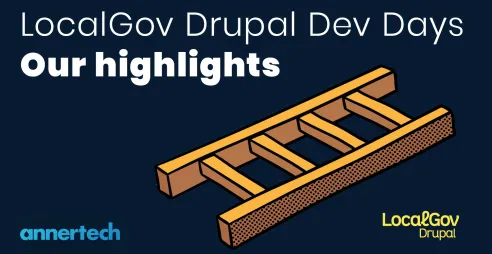The power of accessibility: Saving councils money and boosting service delivery

Accessibility is especially important for public sector websites. Mark Conroy, Annertech’s Director of Development, tackled this topic in Eolas Magazine
Public sector bodies in the European Union must ensure their websites and mobile applications are accessible to everybody, including people with disabilities. In Ireland, it falls to the National Disability Authority (NDA) to ensure that this mandate of the EU Web Accessibility Directive is upheld.
In his article, which appeared in the Digital Government Report this weekend, our Director of Development Mark Conroy explained that, as part of its responsibility to uphold the EU mandate, the NDA reviews a large number of public sector websites and mobile apps on an annual basis.
And its recent monitoring reports indicate that there is a lot more work to be done if the internet – especially public service websites – is to be accessible to everyone.
Accessibility's many advantages
Having an accessible website has many benefits, from ensuring more people can use the website and creating positive brand association, to improving a site’s SEO and reducing potential legal risks.
It also affects budgets and service delivery. In a Nucleus Research study titled “The Internet is Unavailable”, researchers Rebecca Wettemann and Trevor White found that “companies without accessible sites are losing $6.9 billion a year to competitors whose sites are accessible.”
Although public sector websites aren’t focused on selling goods, the research showed how accessibility (or the lack thereof) has a negative effect on resources – organisations without accessible websites end up having to allocate additional resources to their call centres to handle the repercussions.
“If you have problems with accessibility in your digital channel, you are pushing more calls, more traffic, and more work to your call centre even if consumers abandon the transaction,” Wettemann and White found.
Common accessibility issues
An accessibility audit is an evaluation of a website or service to ensure that it is usable by people of all abilities. Consideration is given to users of assistive technologies such as screen readers, magnifiers, and assistive input devices.
The five most common issues that Annertech’s accessibility team encounter are:
- Colour contrast issues – the difference in brightness between foreground and background colours can make a website difficult to read if there isn’t enough contrast
- Designer fonts that screen readers can’t read
- Alt text not being available for images. It’s not just screen readers that access alt text – if an image fails to load for some reason the alt text will explain to the reader what they are missing
- Focus states. If a designer has designed for hover states not focus states, if a user is navigating a website using a keyboard there may be nothing to show the user where the cursor is
- Accessible drop down menus. As with focus states, a user on a website needs a visual cue so they know where they are on the menu. It must also be easy to navigate through the menu using a keyboard.
All of these accessibility issues are “fixable”. However, the best and easiest way to ensure accessibility is to work it into the design and development process.
In other words, start with accessibility, rather than retrospectively trying to fix it.
This can be done by using a platform that is already set up to be accessible. One example of such a platform is LocalGov Drupal.

LocalGov Drupal: An accessible solution for councils
LocalGov Drupal is a publishing platform created by councils, for councils, using the open source Drupal CMS. It’s gaining in popularity: 35 councils in the UK and Ireland have joined the project.
Annertech has been involved with LocalGov Drupal since the beta phase, and is credited with bringing it to Ireland. Mark has been involved with the project from its beta phase, and was instrumental in writing its front-end code.
There are many advantages to LocalGov Drupal: It saves councils money and time, and websites can be developed quickly. The features are tried and tested, and it’s a secure CMS. But one of its biggest advantages is that websites built on LocalGov Drupal are accessible out-of-the-box because the project is designed to meet or exceed WCAG 2.1 level AA.
LocalGov Drupal developers are currently working on making sure LocalGov Drupal meets the newly released WCAG 2.2 guidelines.
Conclusion
Although it’s always better to start accessibility at the conception stage of a website, or to consider a platform that is accessible out-of-the-box such as LocalGovDrupal, websites that are already up and running can be changed to be more inclusive.
Annertech’s accessibility audits identify issues and offer recommendations on how to fix them and Annertech’s accessibility team are on hand to implement any changes.
The quicker a website is assessed the sooner work can begin on ensuring it’s accessible to everyone.

Missed the Digital Government Report in Eolas Magazine?
The Digital Government Report was published this weekend. If you missed it, you can access the digital version here.
Read Mark’s article


